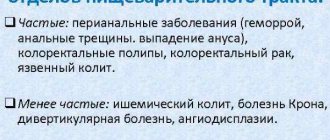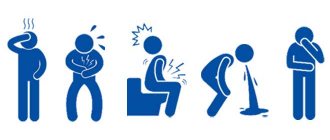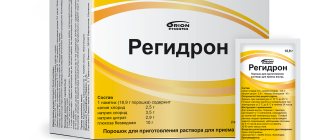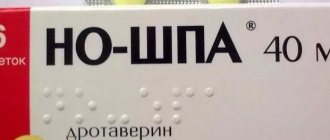What you need to know about food poisoning
A person with food poisoning is not contagious. This disorder develops due to eating foods that contain harmful microorganisms or poisons.
There are 2 types of food poisoning:
- PTI, that is, food poisoning. They develop due to the fact that a person eats foods that contain pathogenic flora. It can multiply in them due to the expired expiration date. Another reason for PTI is non-compliance with sanitary and hygienic standards.
- Toxic poisoning of non-infectious origin. Deterioration in health occurs due to toxins (chemical or natural) entering the body. These can be both chemicals and poisons from mushrooms, plants, etc.
It is non-infectious toxic poisonings that pose the greatest threat to human health. You will not be able to cope with such intoxication on your own; you must immediately contact a doctor.
Pregnant women, elderly people and children should not self-medicate. Even if their poisoning is mild, they should consult a doctor.
Fortunately, most often people encounter poisonings that can be successfully treated at home. The article will discuss how to help the body when uncomplicated PTI occurs.
Helping a person with nausea and vomiting
Vomiting is a natural human reaction to irritating or toxic substances entering the stomach. In addition, this is how we react to severe or prolonged stress, motion sickness or “sea sickness,” hormonal changes during pregnancy (toxicosis), concussion, etc. The occurrence of vomiting is primarily associated with diseases of the digestive system, poisoning unsuitable for consumption of food or incompatible products, ingestion of viruses, in a hypertensive state. Therefore, it is very important to know how to provide first aid for vomiting, how to help a patient if he vomits frequently, and what to do if severe vomiting begins.
Symptoms and pathogenesis
Symptoms of food poisoning will depend on the specific toxin or microorganism that caused the disorder. A person’s age and overall health status matter. However, it is possible to identify common signs of poisoning that occur in both children and adults.
These include:
- Nausea.
- Painful cramps in the stomach and intestines.
- Vomit.
- Diarrhea with a stench uncharacteristic for a healthy person.
- Increased body temperature.
- Weakness and malaise.
- Dizziness, loss of coordination, fainting. These symptoms occur against the background of intoxication of the body.
- Reduced blood pressure. Most often, this symptom occurs in older people.
- Convulsions and other symptoms of damage to the nervous system.
The incubation period for IPT is short. The first signs of poisoning appear within 2-6 hours of eating a toxic product. Toxic infection develops very quickly.
If after 2 days the symptoms of the disorder persist, or if the person’s well-being worsens, it is necessary to consult a doctor. Dangerous signs are: darkening of urine or its absence, dry mouth, increased body temperature, dizziness. All of them signal developing dehydration, which is dangerous not only for health, but also for life.
Causes of vomiting
Many patients do not pay attention to the symptoms of poisoning and are in no hurry to see a doctor. As a result, the pathological condition does not go away, but continues for several days. All this time, poisons and toxins are absorbed from the digestive tract into the blood, poisoning the body, which reacts to poisoning with nausea and vomiting. Stopping vomiting that occurs is not recommended, but only if it is known exactly what caused the intoxication . In some cases, on the contrary, it is necessary to stop vomiting as soon as possible and try to prevent it from occurring until the doctors arrive.
The main causes of nausea:
- accidental ingestion of pesticides,
- drug overdose,
- alcohol poisoning,
- taking medications without taking into account contraindications,
- drug overdose,
- prolonged inhalation of carbon monoxide,
- ingestion of solvent vapors and other toxic substances into the body,
- inhalation of fumes of paint, gasoline, kerosene,
- eating poisonous mushrooms,
- poisoning from spoiled foods,
- intoxication by parasites (helminths).
It is impossible to control nausea and vomiting, but you can relieve your condition by drinking a warm, sweetened drink or an antiemetic tablet.
Important: in case of a serious condition, first aid measures are aimed at ensuring that the patient can wait for the doctor to arrive.
Vomiting is preceded or occurs simultaneously with the following symptoms:
- labored breathing,
- heat,
- dizziness,
- weakness,
- drowsiness,
- blood pressure surges,
- heartbeat,
- chills, trembling,
- profuse cold sweat,
- irritability, hysteria,
- lack of interest in food.
When is it necessary to call a doctor or go to the hospital?
The action depends on how long the vomiting lasts. Nausea can be one-time or occur several times throughout the day. This condition indicates that there are toxic substances in the gastrointestinal tract. A doctor's examination is necessary if vomiting occurs repeatedly. A specialist will be able to make an accurate diagnosis based on an external examination or test results, after which drug treatment will be prescribed.
If an attack of nausea and vomiting occurs once, it is necessary to remember what events preceded this condition. Perhaps, a few hours before the deterioration of health, the person experienced stress, overate, overheated in the sun, drank too strong coffee or tea, got sick in a car, and so on. In addition, vomiting is a characteristic sign of alcohol intoxication. What to do: specific treatment is not necessary, but you still need to rinse the stomach .
If you feel dizzy, weak and drowsy, you should take a horizontal position and lie quietly for several hours. As a rule, this is enough to make you feel better. The situation is different when gag reflexes occur one after another, with an interval of several minutes or hours.
People who have heart and vascular problems, suffer from hypertension, diabetes, chronic diseases of internal organs or experience frequent dizziness should be especially attentive to their health.
Dangerous symptoms
If nausea has been going on for a long time, and vomiting is accompanied by severe pain in the abdominal area, you should urgently call a doctor at home. Emergency care is also necessary if the following symptoms are present:
- feeling of thirst and dry mouth,
- frequent urination,
- blood particles in urine or stool,
- any signs of dehydration,
- severe weakness
- mental disorder,
- a state close to fainting.
On a note. For children under 3 years of age and the elderly, an ambulance is called for vomiting, regardless of whether there are other symptoms.
First aid for poisoning
The main task facing a person with food poisoning is removing toxins from the body. It is also necessary to prevent a serious disturbance of the water-salt balance.
First aid comes down to the following actions:
- Gastric lavage. The patient should drink as much water as possible, after which he is induced to vomit. The procedure is repeated until the liquid coming out of the stomach becomes absolutely clear. If possible, replace water with a weak solution of potassium permanganate. This allows for disinfection of the gastrointestinal tract. The solution should have a pale pink color. Manganese must be thoroughly dissolved and strained through gauze folded in 4 layers. You can also prepare a soda solution (take a teaspoon of soda per liter of water). If the vomit suddenly becomes black, stop rinsing the stomach. This sign indicates gastric bleeding, which requires emergency hospitalization. This complication often occurs in people with stomach ulcers or gastritis.
- Colon cleansing. If a person does not develop diarrhea, they need to take a laxative or do an enema. This will remove toxins from the intestines. For an enema, use plain water. It should be boiled and at room temperature. The enema is also repeated several times. We need to ensure that the waters become clean.
When first aid is provided to the patient, you can offer him folk and pharmacy remedies.
First aid
To stop vomiting you do not always have to resort to medications. Sometimes exposure to certain physical factors or the use of folk remedies is sufficient.
General recommendations
At home or at work, you can resort to the following manipulations:
- Sit down, close your eyes, relax. But don't lie down, as this will increase the risk of vomiting.
- Take a few deep breaths. At the height of inhalation, hold your breath for a few seconds.
- Ventilate the room. If it's hot outside, use air conditioning if possible.
- Cool your forehead and neck with a damp compress.
- Smell the Star Balm or a sprig of mint.
- Drink cold still water in small sips; you can also swallow small pieces of ice.
- Eat a mint candy or chew menthol gum. Not only the antiemetic effect is important, but also the mechanical effect of frequent swallowing on the motility of the gastrointestinal tract.
- Massage biologically active points located on the inner surface of the forearms, 3 transverse fingers further from the base of the palm.
Until the vomiting stops, you should not eat. Only drink in small portions.
Vomiting due to motion sickness deserves special attention. Dr. E. O. Komarovsky talks in the video about how to deal with this problem in children. Keep in mind that for adults, the ways to combat motion sickness are practically the same.
Folk recipes
We offer you a choice of several folk remedies to help get rid of vomiting:
- Finely chop 3 sweet apples, pour 1 liter of boiling water, add a teaspoon of grated ginger root. Cool and drink in small sips.
- Brew green tea with mint or lemon balm. Chamomile tea also helps. They should be drunk warm in small quantities.
- Grind the lemon and add a liter of water, let it brew for a while. Enjoy the drink chilled. You can also simply chew a piece of lemon.
- Pour 5-10 g of fennel or dill seeds into 200 ml of boiling water and drink after 15 minutes.
- Pour 2 tbsp. l. licorice root 500 ml of boiling water and evaporate over low heat until 250 ml of liquid remains. The decoction should be drunk after cooling.
Drug therapy
Among pharmaceutical products for stopping vomiting, several groups of drugs are suitable:
- Prokinetics (domperidone, metoclopramide) normalize the motility of the gastrointestinal tract, directing it in the right direction. If you cannot take the pill due to uncontrollable vomiting, then metoclopramide injections come to the rescue.
- Anticholinergics (buscopan, riabal) relieve spasm from the smooth muscles of the digestive tract, accelerate gastric emptying and enhance its motor activity.
- Antihistamines (pipolfen, diphenhydramine) are effective for vestibular vertigo.
- Betahistine is also used for problems with the vestibular system, but this is not an emergency medicine. It exhibits a therapeutic effect gradually and is prescribed simultaneously with antiemetics.
- Enzyme preparations (mezim, panzinorm, creon) are also auxiliary means in the fight against vomiting caused by overeating or poor diet.
- Enterosorbents (polysorb, activated carbon) by themselves do not stop vomiting, but they stop further absorption of toxins in the digestive tract in case of poisoning and speed up recovery.
- Neuroleptics (droperidol, prochlorperazine) are drugs that inhibit the function of the vomiting center. They are prescribed only in extreme cases and only in a hospital setting.
It is impossible to list all the causes of vomiting and the means to combat them in one article, but keep in mind that if the source of the disease is obvious, all efforts must be directed towards its elimination. For example, if there is a sharp increase in blood pressure, which is accompanied by vomiting, you first need to reduce it. Captopril tablets are usually used for this.
If vomiting is a consequence of seasickness, then it is possible to use anti-motion sickness drugs - Dramamine, Ciel.
Attention! In case of uncontrollable vomiting, vomiting with blood, poisoning with drugs or chemicals, it is necessary to urgently seek medical help. This also applies to cases of brain injury and disease. Signs of its damage include weakness in an arm or leg, loss of sensation in a certain area of the body, facial asymmetry, and speech impairment.
What medicines should you take if you are poisoned?
If the poisoning is mild, then you can cope with it without taking any medications. It will be enough to limit yourself to observing the drinking regime and diet.
Basic therapeutic measures that can be implemented at home:
- Relieving symptoms of intoxication.
- Removing toxins from the body.
- Restoration of intestinal microflora.
- Stabilization of the digestive system.
It must be remembered that only a doctor can correctly assess a person’s well-being.
Rehydration therapy
Diarrhea and vomiting cause the body to rapidly lose water reserves. To prevent this from happening, you need to drink about 3 liters of liquid per day. It needs to be salted. Take a teaspoon of salt per liter of water. You can alternate water with sweet tea. It is also allowed to take medications for rehydration, for example, Regidron or Oralit. They come in powder form and must be dissolved in boiled water before taking.
Regidron is the most popular drug for restoring water-salt balance. It is used for infectious diseases and diarrhea of various origins. One bag of powder is enough to prepare a liter of solution. More often than not, there are no side effects from taking the drug.
What to do if you are vomiting
If gastric emptying occurs more often than every hour, it is advisable to call a doctor. Before his arrival, first aid must be provided to the patient. The easiest case is when there is vomiting without fever. What to do about this?
- put the patient in bed, preferably on his side;
- Drink small portions of water, tea or unsweetened compote as often as possible;
- Powders containing potassium and magnesium salts “Regidron” or “Oralin” will help alleviate the patient’s condition; if it is not possible to purchase them, then you need to dilute a teaspoon of salt and sugar in a liter of boiled water;
- It is recommended to drink activated carbon - 1 tablet per 10 kilograms of weight;
- You can put ice on your stomach;
- for nausea, if there is no strong urge to vomit, it is recommended to sniff mint essential oil or ammonia.
Intestinal infections include diarrhea, vomiting and fever. What to do in this case? Before the doctor arrives, you can drink enterosorbent - activated carbon or Polysorb. It is permissible to start taking antiseptics that do not irritate the gastrointestinal tract, for example, Enterol or Ersefuril.
Nutrition after poisoning
On the first day after poisoning, it is recommended to only drink water, weak black or green tea, and rosehip decoction. On the second day, you can eat purees and vegetable broths. Porridge is boiled in water.
Dishes must be warm. The patient is offered small portions. Their volume is increased gradually.
Eat food 6-7 times a day. This allows you to quickly normalize the digestion process. When the gastrointestinal tract function returns to normal, you can supplement the diet with rice porridge, low-fat broth, and crackers.
Authorized Products
Permitted products include:
- Steamed meat cutlets. They are included in the menu from day 3 of the diet.
- Casserole.
- Pudding with cottage cheese.
- Steamed fish meatballs.
- Buckwheat and rice on water.
- Baked and boiled vegetables.
- Dill decoction.
- Rice soup.
- Homemade crackers.
- Steamed omelette.
- Baked apples and pears.
- Chamomile tea.
- Fruit jelly.
A week after poisoning, fermented milk products are introduced into the menu, which help restore the intestinal microflora. It is important to drink plenty of water to prevent dehydration and its severe consequences.
Prohibited Products
Foods that should not be eaten:
- Any conservation.
- Bakery.
- Alcohol.
- Sausages.
- Dairy products.
- Salty fish.
- Barley and corn.
- Chocolate.
- Meat broths.
- Lard and meat.
- Caviar.
- Fresh vegetables and fruits.
- Legumes.
These products contribute to flatulence, increase pain, provoke the production of enzymes, and trigger fermentation processes in the intestines. If you do not exclude them from the diet, the recovery of the body will be delayed.
Vomiting in children
Poisoning in children occurs frequently. Usually the reason is due to poor quality products. Vomiting in a small child must be treated with special attention and proper care must be provided. If the case is not isolated, is accompanied by diarrhea and high fever, or the baby complains of pain, consult a doctor.
Drinking regime
The first thing to do during and after vomiting is to provide the child with plenty of fluids. Drinking regime is important, as for adults: water helps remove toxins faster. A water-salt solution will help get rid of vomiting. The volume of liquid is calculated based on the child’s weight - 150 ml per kilogram. Young children are given a teaspoon of water at room temperature every 10 minutes.
Nutrition
When the nausea has stopped, it is better not to eat right away. It is recommended to wait until the next day. Products should be selected that are easy to digest. Infants do not need any other nutrition; mother's milk normalizes the activity of the stomach. The mother must follow a diet. It is necessary to choose foods that are easier to digest.
From the age of one year, start feeding porridge with milk diluted with water, gradually introducing baby cottage cheese, vegetable puree, and juices into the diet. At first, it is recommended that older children be given rice and buckwheat porridge with water. Oatmeal is fine. The porridge should be boiled and unsweetened. If desired, instead of sugar, add dried fruits, focusing on your well-being.
The following foods will improve stomach function:
- banana puree (bananas are an essential source of microelements);
- baked apples remove toxins and reduce nausea;
- decoction of dried fruits;
- boiled vegetables (carrots, broccoli);
- plain yoghurts;
- non-acidic kefir.
Products should not irritate the gastric mucosa; it is better to prepare semi-liquid food and grind solid food using a blender. The food is cooled to a comfortable temperature. If the child is not hungry, there is no need to force him to eat. The body will independently determine the optimal amount and frequency. After one or two days, you can diversify your diet with low-fat dishes, boiled or steamed.
It is extremely important to replenish the animal protein content. Liquid chicken broth perfectly soothes the mucous membrane and saturates the body with nutrients. Gradually, the menu includes stewed vegetables and familiar dishes. It is recommended to consume food in small portions, but often. Gradually portions and intervals are increased.
Recovery lasts up to three weeks, depending on the duration of vomiting. During this period, the body needs vitamins and minerals. The doctor may prescribe medications high in vitamins A, B and C to improve metabolism and increase the body's resistance. In case of prolonged vomiting, a vitamin complex is required.
To avoid re-poisoning, check the expiration date and quality of the products. If the diet does not help, the nausea does not go away, you need to take medicine and call a doctor. After prolonged vomiting, severe dehydration occurs. Prolonged vomiting can lead to serious consequences, chronic diseases, and death.
Prevention
To prevent food poisoning, you need to eat only fresh and high-quality foods. The kitchen should always be clean. Fruits, herbs and vegetables should be washed thoroughly.
Prepared dishes should be stored under a closed lid; yesterday's food is recommended to be boiled.
Be sure to wash your hands before approaching the table. Compliance with sanitary and hygienic standards is the best prevention of food poisoning.
Author of the article:
Gorshenina Elena Ivanovna | Gastroenterologist
Education:
A diploma in the specialty “General Medicine” was received at the Russian State Medical University named after. N. I. Pirogova (2005). Postgraduate studies in the specialty “Gastroenterology” – educational and scientific medical center. Our authors
Source
Vomiting due to poisoning
Vomiting is a complex process, which is a reflex release of the contents of the stomach (often the small intestine) through the mouth as a result of contraction of the abdominal muscles and stimulation of the vomiting center of the medulla oblongata. This is a reaction that occurs when microbes and toxic compounds enter the stomach. Most often, vomiting occurs due to poisoning with drugs, mushrooms, food, alcohol and narcotic substances. Helps cleanse the gastrointestinal tract of toxic substances. Everyone should know what to drink when poisoning and vomiting. The problem, if not properly treated, can cause fluid loss, dehydration, hypovolemic shock, asphyxia, reflux of food into the respiratory tract with the development of tracheobronchitis and pneumonia.
Antiemetics
Special medications - antiemetics - help stop severe vomiting attacks. The drugs differ in their action. It is necessary to take them only as prescribed by a doctor so that the condition does not worsen. There are three groups of antiemetic medications:
- central action - neuroleptics, antihistamines, dopamine and serotonin receptor blockers;
- peripheral influence - local antispasmodics, painkillers;
- mixed action - with a comprehensive solution to the problem.
Medicines help cure vomiting caused by diseases:
- neuroleptics - Triphasin, Aminazine - eliminate the symptoms of drug poisoning, are effective during pregnancy, radiation sickness, and in the period after surgery;
- antihistamines - Diprazine, Diazolin - cope with motion sickness caused by disturbances in the functioning of the vestibular apparatus;
- antiseptics – Enterofuril, Intetrix – destroy bacteria in infectious diseases of the stomach and duodenum.
Medicines selected for the treatment of certain pathologies can stop vomiting:
- migraine, traumatic brain injury - dopamine receptor blockers - Motilium, Zofrom;
- gag reflex during treatment and diagnosis by an ENT doctor - local anesthetic - Lidocaine;
- chemotherapy for oncology – Sertonon, Latran, Haloperidol;
- intestinal infections – Ersefuril;
- for a neurogenic cause of urge - Tenoten, Persen;
- universal medicine - Metoclopramide.
- How to reduce your appetite
- Salt dough is a recipe for making material for sculpting crafts. How to make salt dough - photo, video
- May beetle - habitat and development stages. What does the cockchafer eat and how to get rid of the larvae
Central acting anti-vomiting agent
Drugs in this group have an inhibitory effect on the vomiting center, its chemoreceptor trigger zone located in the medulla oblongata. As a result, an impulse is not sent to the muscles that provoke the reflex effect. There are several types of centrally acting agents. These include:
- neuroleptics - Triphasin, Aminazine - used for poisoning, radiation treatment, pregnancy;
- antihistamines - Dimenhydrinate, Diphenhydramine - eliminate vomiting of vestibular origin.
Centrally acting agents include:
- Histamine receptor blockers, with a depressing effect on the central nervous system, accelerating peristalsis and bowel movements - Domperidone, Motilium. Medicines are prescribed for vomiting caused by infections, gastrointestinal dysfunction, and poor diet.
- Seratonite receptor blockers - Tropisetron, Latran - stop vomiting caused by gastric dyspepsia after surgery or chemotherapy.
Peripheral drugs
This antiemetic group of drugs acts at the level of efferent, afferent nerve endings involved in the mechanism of formation of the gag reflex. Peripheral medications include local anesthetics:
- Lidocaine, Benzocaine - used when performing otolaryngological manipulations - operations, treatment, bronchoscopy, anesthesia;
- Anestezin, Novocaine - help with vomiting caused by inflammation of the gastrointestinal tract, provoked by ulcerative processes.
Among the drugs of peripheral action are local antispasmodics. They are used for retching caused by disturbances in evacuation and motor function in acute and chronic inflammation of the gastrointestinal tract and biliary tract. Medicines include:
- Atropine, No-shpa, Papaverine, which have myotropic, anticholinergic properties;
- Bellasthesin is a combination drug that relaxes smooth muscles.
Mixed action
The popular antiemetic drug is effective for symptoms of various etiologies. A mixed-action medicine, Metoclopramide, quickly eliminates painful urges. The drug counteracts hiccups, activates gastrointestinal motility, stops the gag reflex caused by:
- poor quality food;
- traumatic brain injuries;
- pregnancy;
- release of bile;
- kidney pathologies;
- radiation sickness;
- chemotherapy;
- taking antibiotics, anesthesia drugs, cytostatics.
Metoclopramide, a dopamine receptor blocker, is used in the form of injections and tablets. For the drug, according to the instructions, the following are determined:
- dosage – tablet 4 times a day, half an hour before meals, do not chew, wash down with water;
- contraindications – intestinal obstruction, bleeding in the gastrointestinal tract, hypertension, old age, 1st trimester of pregnancy, children under 14 years of age, glaucoma;
- side effects - increased blood pressure, drowsiness, depression, tremors of extremities, diarrhea, anxiety;
- analogues - Cerucal, Clometol, Comportan, Bimaral, Primperan, Plastil.
Character of vomiting in case of poisoning
Vomiting in case of poisoning (intoxication) has the following features:
- It occurs reflexively in response to irritation of the mucous membrane of the stomach and small intestine.
- It is provoked by taking medications, inedible or conditionally edible mushrooms (if improperly prepared), foods with a high content of bacterial toxins and microbes, alcoholic beverages, alcohol surrogates, pesticides, nitrates, inhalation of harmful vapors and aerosols.
- It can be single or multiple (represents the greatest danger).
- Frequency - up to 15 times a day or more (the most severe with botulism).
- Vomit may contain microbes and their toxins (during foodborne illnesses and intoxications), gastric juice and fragments of undigested food.
- Occurs in the early stages.
- Appears a few hours after microbes or toxic compounds enter the body (most often in the first 12 hours).
- Accompanied by heartburn, sour or bitter (with liver damage) taste in the mouth.
- Combined with other symptoms of poisoning (increased salivation, diarrhea, fever, abdominal pain, bloating, pale and dry skin, drop in blood pressure, nausea). With botulism, along with vomiting, constipation, blurred vision, dysphagia and speech disorders are possible. Diarrhea and vomiting are accompanied by dehydration, which leads to a weakened pulse, lethargy and lethargy.
Attacks in the evening and at night
Most often, uncomfortable conditions for a person develop in the evening and at night, nausea is no exception. Severe evening nausea can be a sign of significant physical fatigue. The reason could be, for example, irregular working hours.
The next likely reason is overeating in the afternoon. As evening approaches, the rate of metabolic reactions decreases, which leads to slower functioning of the digestive tract. Food stays in the stomach for a long time, which causes nausea.
To avoid the development of an uncomfortable condition, it is necessary to refrain from eating foods that are difficult to digest. The food should be light and the portions should be small. Pathological conditions, in particular dysbacteriosis or inflammation of the appendix, can also be causes of evening and night nausea.
Late intake of medications can provoke an attack of lightheadedness in the evening or at night
What is the best remedy for vomiting in case of poisoning in an adult?
To stop vomiting you will need:
Replenishing fluid deficiency with a dropper
- restoration of the volume of lost fluid;
- giving the patient a comfortable body position;
- taking medications;
- refusal of food;
- cessation of exposure to toxic substances on the body.
Conditions for stopping vomiting are restoring intestinal function, removing toxins from the body, reducing the excitability of the trigger zone of the vomiting center. If you feel unwell, the following medications may be prescribed:
- Metoclopramide. The drug stimulates peristalsis, blocks dopamine receptors, increases the threshold of the trigger zone and accelerates the emptying of the stomach and small intestine, which helps reduce reflux (return of food into the esophagus and oral cavity). Contraindicated in case of individual intolerance, gastrointestinal bleeding, perforation of the stomach wall, epilepsy, intestinal obstruction, glaucoma, pheochromocytoma, during pregnancy and lactation, and prolactinoma.
- Cerucal. The active ingredient is metoclopramide hydrochloride. Available in the form of tablets for oral administration and solution for injection.
- Perinorm.
- Motilium. Centrally acting antiemetic drug. The active ingredient is domperidone. The mechanism of action is associated with the effect on gastric motility and antagonism with dopamine receptors located in the trigger zone. The drug is used to relieve nausea and vomiting. Motilium is contraindicated in cases of hypersensitivity, prolactinoma, lactose intolerance, lactase deficiency, malabsorption syndrome, severe electrolyte disturbances, bleeding, low body weight, pregnant and lactating women.
- Motonium.
- Motilak.
- Passengers.
- Domstal.
- Domperidone.
You can use traditional medicine (ginger, dill, peppermint). Based on them, decoctions and infusions are prepared for oral administration.
Vomiting: causes and first aid, antiemetic medicine
Every person has experienced nausea and vomiting at least once in their life. This unpleasant phenomenon greatly weakens the body and can lead to dehydration. The process of vomiting itself is a reflexive ejection of the contents of the stomach. Vomiting can be painful and excruciating, so it is important to be able to stop it in time and provide first aid.
Possible causes of vomiting
A possible cause of vomiting is food poisoning.
The causes of vomiting can be very different; only a doctor can reliably determine them. Prolonged or regular vomiting requires careful evaluation. Before vomiting, a person usually feels severe nausea. Already at this stage, you can take an antiemetic medication to avoid dehydration.
After a feeling of nausea, vomiting begins, the walls of the abdominal muscles begin to actively contract, the esophagus expands and the contents of the stomach come out. Possible causes of vomiting include the following:
- Infection. Some infections cause the body to react by vomiting. This may cause diarrhea, fever and other symptoms that require immediate medical attention.
- Food and other poisoning. Vomiting from food poisoning is the most common occurrence. In addition to vomiting, it is accompanied by diarrhea, abdominal pain, prolonged nausea, weakness, and chills. You can be poisoned by stale food, mushrooms, alcohol and other substances. The most dangerous poisoning is methyl alcohol, which leads to serious complications, often ending in death.
- Motion sickness. Vomiting can occur due to motion sickness in transport. In this case, the vomiting center of the brain is irritated. A person begins to feel sick and vomit when traveling on any transport.
- Toxicosis. Pregnant women often experience toxicosis in the early stages of pregnancy. A woman feels sick and vomits, usually in the morning or in the presence of an irritant (product, smell, sight). Toxicosis can also appear in later stages.
- Diseases of the gastrointestinal tract. Some diseases of the stomach, pancreas, and liver lead to nausea and vomiting. These include pancreatitis, hepatitis, gastritis, etc.
- Diseases of the central nervous system. With diseases of the nervous system, cerebral edema, severe migraines, vomiting often occurs.
A detailed video will tell you about the causes and symptoms of vomiting:
First aid for vomiting
The first step before the ambulance arrives is to put the patient to bed.
Vomiting is a symptom, not an independent disease. Treatment for this condition begins with identifying and eliminating the causes of vomiting. To do this, you need to see a doctor and undergo an examination.
Read: Thrush in guys. The reason is dysbacteriosis???
Severe and persistent vomiting requires hospitalization. Before the ambulance arrives, you can take measures yourself:
- The patient must be put to bed. When the body is positioned horizontally, spasms are relieved and it becomes easier. If the urge does not stop, the body position should allow you to empty your stomach in time. To do this, you need to provide a convenient container, for example, a small basin.
- After each attack of vomiting, it is advisable to rinse your mouth and wash your face. No solutions are needed, just plain warm water is enough. If the patient is so weak that he cannot rinse his mouth on his own, his oral cavity is treated with sterile cotton wool with a solution of boric acid.
- You cannot eat anything or warm your stomach while vomiting. You can give clean, cool water in small quantities or an ice cube. This will relieve nausea and quench thirst. You cannot give medicinal water, especially carbonated water, without a doctor’s advice and until the causes of vomiting are clarified.
- It is not recommended to rinse the stomach yourself, provoking a new attack of vomiting.
- Do not give water or food if you are vomiting coffee grounds. This indicates the presence of internal bleeding, requiring immediate hospitalization.
- It is better to take any anti-vomiting medications after consulting a doctor. If they have already been taken, you must inform the emergency doctor about this.
- If you vomit, you can give Regidron solution. It restores water balance in the body and protects against dehydration.
It is worth remembering that self-medication with severe vomiting and nausea can lead to serious complications.
If the patient experiences loss of consciousness, a sharp drop in blood pressure and temperature, or pale skin, self-medication should be stopped and an ambulance should be called immediately.
Antiemetic drugs
Chophytol is prescribed to pregnant women whose nausea is caused by liver dysfunction.
At the moment, you can find a large number of drugs for nausea and vomiting in pharmacies. Most of them are sold without a prescription.
However, taking such drugs in courses requires mandatory consultation with a doctor. Constantly treating symptoms will not cure the disease itself. Remedies for nausea will depend on the cause of its occurrence:
- Cerucal. The drug is available in tablets and solution for injection. When taking tablets, the drug begins to act within half an hour. It can be taken for isolated cases of vomiting or in courses to prevent nausea and vomiting after surgery and chemotherapy. Cerucal is not prescribed to pregnant women, children under 15 years of age, nursing mothers, people suffering from epilepsy and Parkinson's disease.
- Motilak. This drug eliminates nausea and vomiting of any etiology. Available in the form of lozenges. It is better to take the drug on an empty stomach; after eating, the acidity of the gastric juice decreases, which complicates the absorption of the drug. The drug is prescribed for indigestion, reflux, heartburn, vomiting caused by infection or poisoning. Contraindications are internal bleeding, vomiting like coffee grounds, and age under 5 years. Pregnant women are prescribed Motilak after consulting a doctor.
- Hofitol. This drug protects liver and gallbladder cells and is not an antiemetic, but is often prescribed to pregnant women whose nausea is caused by liver problems.
- Lorazepam. This remedy is a sedative that relieves anxiety and stress, and it also eliminates various manifestations of this condition such as nausea, vomiting, headaches, and insomnia. It should not be taken for a long time, as it is addictive. For severe depression, epilepsy, shock, and serious brain damage, the drug is not prescribed.
Medicines for motion sickness
Many people suffer from motion sickness nausea, including young children under one year old and pregnant women. Motion sickness makes any trips, flights, or long journeys unbearable.
Cocculin should be taken only after consulting a doctor.
Nausea and vomiting during motion sickness occur due to the reaction of the vestibular apparatus to various traffic movements. The simplest way to stop nausea is to stay in the air at rest. In cases where it is impossible to interrupt the trip, various drugs for motion sickness are used:
- Air-sea. The drug prevents motion sickness in any type of transport by influencing the reaction of the vestibular apparatus. The tablet is dissolved in the mouth immediately before the trip. This procedure can be repeated every half hour until the end of the trip. There are no side effects, but the drug is not recommended for children under 3 years of age.
- Dramamine. The tablets begin to act 15-20 minutes after administration. The effect lasts up to 6 hours. The drug is approved for children from one year of age, but is not recommended for pregnant and lactating women. Dramamine is taken before meals, about half an hour before boarding the transport.
- Kokkulin. The drug can be taken by children from 3 years of age. Available in lozenges. During pregnancy, the drug is not contraindicated, but is used only after consulting a doctor. No side effects or cases of overdose were observed.
- Bonin. The drug can be prescribed both for motion sickness and for nausea and vomiting of other etiologies. Chewable tablets can be taken by children over 12 years of age, and by younger children only as directed by a doctor.
- Phenibut. The drug is intended for the treatment of anxiety, it also eliminates dizziness and nausea. It is not recommended to take it during breastfeeding and gastrointestinal ulcers. Phenibut is taken after meals up to 3 times a day.
Other remedies for nausea and vomiting
Ammonia helps relieve vomiting.
Any medications for nausea and vomiting should be prescribed by a doctor. There are some folk remedies that will help relieve nausea, but you should not get carried away with them until you undergo an examination.
In some cases, when it is necessary to relieve an attack of vomiting, ammonia helps. It is recommended to inhale it for a short time, this will help prevent vomiting. Ammonia vapor contains a large amount of vitamin C, which has an antiemetic effect.
It is believed that a starch solution helps eliminate vomiting. Pour a spoonful of starch into warm water, mix thoroughly and drink.
For vomiting due to food poisoning, traditional medicine offers the following recipe: mix a spoonful of salt, soda and 8 teaspoons of sugar, add water and drink. However, taking this medicine without determining the cause of vomiting is dangerous because it can irritate the walls of the stomach.
Chicory is useful for food poisoning. However, chicory needs to be infused all night, so in emergency cases this method is not suitable. A decoction of blackberry branches will help eliminate vomiting and diarrhea. A tincture of tangerine and lemon peels also helps relieve nausea and vomiting due to its high vitamin C content.
If vomiting is caused by motion sickness in transport, instead of pills, you can try using a special acupuncture bracelet (for example, Travel Dream).
The bracelet can be used even during pregnancy. The bracelet is worn in such a way that it constantly affects the acupuncture point, preventing the occurrence of motion sickness symptoms.
For young children (from one to three years old) there are special anti-motion sickness patches. It contains extracts of various herbs, so you need to monitor for allergic reactions. Herbal components have a calming effect, relieve nausea and vomiting, relieve dizziness and lightheadedness during motion sickness. The patch is glued to the area behind the ears. It lasts up to 6 hours.
Select it and press Ctrl+Enter to let us know.
Tell your friends! Share this article with your friends on your favorite social network using social buttons. Thank you!
Tweet
Telegram
Class
What's up
Source: https://PishheVarenie.com/zabolevaniya-zhkt/rvota-prichiny-i-pervaya-pomoshh-protivorvotnoe-lekarstvo/
Dangerous manifestation of artificial vomiting
Inducing vomiting artificially (by pressing on the root of the tongue) is necessary only during the process of gastric lavage, when water, saline solution or potassium permanganate solution is supplied. If you do not follow the rule, the following consequences are possible:
- Aspiration of vomit.
- Irritation and burn of the mucous membrane of the esophagus and oral cavity. Possible in case of poisoning with acids and alkalis, with increased acidity of gastric juice. Irritation of the mucous membrane can provoke bile, which is often found in vomit.
- Dehydration of the body. It is observed with frequent induction of artificial vomiting. It is characterized by a decrease in the volume of circulating blood and a decrease in the amount of fluid in the tissues.
- Electrolyte imbalance (decreased potassium, sodium and chlorine).
- Blood thickening.
- Thrombosis.
- Metabolic alkalosis. It means a shift in the reaction of the medium towards the alkaline side.
- Pneumonia. It is characterized by inflammation of the lung tissue when vomit enters the trachea and bronchi. Manifested by chest pain, shortness of breath and cough.
- Hypovolemic shock.
- Coma.
- Impaired consciousness.
- Decreased diuresis up to anuria.
- Convulsive syndrome.
- Mental disorders.
- Arterial hypotension (low blood pressure).
- Kidney diseases, dysfunction of the heart and brain.
You cannot artificially induce vomiting in case of poisoning with acids, alkalis, household chemicals, gasoline, kerosene, antifreeze and solvents - this can lead to damage to the larynx, ligaments and esophagus. In such a situation, a probe is used to lavage the stomach.











